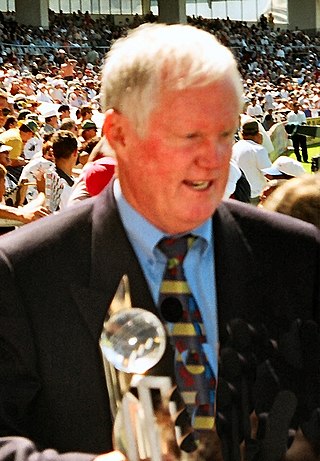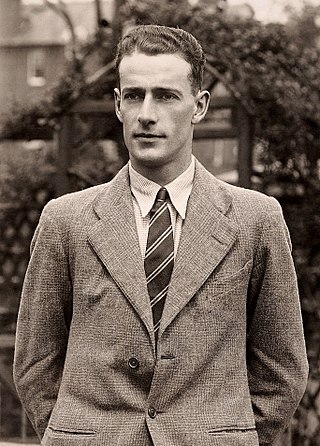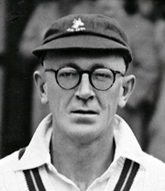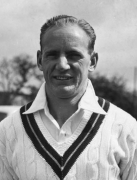Related Research Articles

Robert Graeme Pollock is a former cricketer for South Africa, Transvaal and Eastern Province. A member of a famous cricketing family, Pollock is widely regarded as one of South Africa's greatest ever cricketers, and as one of the greatest batsmen in the history of cricket. Despite Pollock's international career being cut short at the age of 26 by the sporting boycott of South Africa, and all but one of his 23 Test matches being against England and Australia, the leading cricket nations of the day, he broke a number of records. His completed career Test match batting average of 60.97 remains the third best behind Sir Don Bradman and Adam Voges.

Alan Melville was a South African cricketer who played in 11 Test matches from 1938 to 1949. He was born in Carnarvon, Northern Cape, South Africa and died at Sabie, Transvaal.

Herbert Wilfred Taylor was a South African cricketer who played 42 Test matches for his country including 18 as captain of the side. Specifically a batsman, he was an expert on the matting pitches which were prevalent in South Africa at the time and scored six of his seven centuries at home. His batting was also noted for quick footwork and exceptional 'backplay'. He became the first South African to pass 2,500 Test runs and was selected one of Wisden's Cricketers of the Year in 1925. In domestic cricket, he played for Natal, Transvaal and Western Province.

Geoffrey Walter Ashton Chubb was a South African cricketer who played five Test matches for South Africa on the tour of England in 1951 aged 40.
Charles Frederick Henry Prince was a South African cricketer who played in one Test in 1899.

Albert Edward Ernest Vogler was a South African cricketer. A leading all-rounder skilled both at batting and bowling, Vogler played cricket in South Africa prior to becoming eligible to play for Middlesex County Cricket Club in England after serving on the ground staff of the Marylebone Cricket Club at Lord's. He rose to prominence during the 1906 home Test series and then in England the following year: he was described during the latter as the best bowler in the world by Tip Foster, and named a Wisden Cricketer of the Year.

Quintin McMillan was a South African cricketer who played in thirteen Test matches between 1929 and 1931/32.
Pieter Gerhard Vintcent van der Bijl was a South African cricketer who played in 5 Tests in 1938–39. His son, Vintcent, also had a successful first-class cricket career.

Ronald George Draper is a South African former cricketer who played in two Tests in 1950. He played first-class cricket from 1945 to 1959. Since 3 September 2021 he has been the oldest living Test cricketer.

Anton Ronald Andrew Murray was a South African cricketer who played in 10 Test matches in a little over a year from December 1952 to February 1954, appearing four times against Australia and then six times against New Zealand. He later toured England as a member of the 1955 South African side but did not appear in any of the Tests there. Outside cricket, he was a schoolmaster who founded a noted school in Pretoria.

Edward Russell Henry Fuller was a South African cricketer who played in seven Test matches between 1953 and 1957. He was born in Worcester, Western Cape and died in Milnerton, Cape Town.
Alistair Innes "Scotch" Taylor was a South African sportsman who played first-class cricket and hockey for Transvaal, and captained the Transvaal cricket team for four seasons. Taylor represented South Africa in one cricket Test in 1956. He was an alumnus of the King Edward VII School, set up a squash section in the Old Edwardians club, and was elected president of the South African Hockey Union.

David Bartlett Pithey was a Rhodesian cricketer who played in eight Tests for South Africa from 1963 to 1967. As well as playing for Rhodesia and Western Province, he played first-class cricket for Oxford University and Northamptonshire. Christopher Martin-Jenkins described him as "spasmodically brilliant". His brother, Tony, also played Test cricket for South Africa; they played together in five of the Tests on the 1963–64 tour of Australasia.
Sidney Hugh Martin was a South African first-class cricketer who played 267 first-class games in both South African and English cricket. He was the uncle of South Africa Test cricketer Hugh Tayfield.
Rupert de Smidt was a South African cricketer who played first-class cricket for Western Province. He is the fifth oldest of the 23 first-class cricketers known to have surpassed 100 years of age.
Dr Basil George von Brandis Melle was a South African first-class cricketer who played as a right-handed batsman and bowled right-arm medium pace and later leg breaks. David Frith saw Melle as playing a role in the origins of bodyline bowling through his 'inswingers with three short-legs'.
Brian Dennis Gessner is a former South African cricketer. Gessner was a left-handed batsman who bowled left-arm fast-medium. He was born in Durban, Natal Province.
The 1889–90 Currie Cup was the inaugural edition of the Currie Cup, the premier first-class cricket tournament in South Africa. The 1889–90 competition involved just two teams, Transvaal and Kimberley. The two sides played a single, three-day match, which was won by Transvaal by six wickets.
Frederick Steven Goldstein was a cricketer who played first-class cricket in England and South Africa from 1966 to 1977.
Ian Ramsay Fullerton is a former cricketer who played first-class cricket in South Africa from 1958 to 1965.
References
- 1 2 Cricketer of the Year 1978: Ken McEwan
- ↑ 1983 County Championship most runs
- ↑ Worthing Cricket Association: A History of 37 Seasons from 1952 to 1988 by Laurie Claydon (Competitions Secretary)